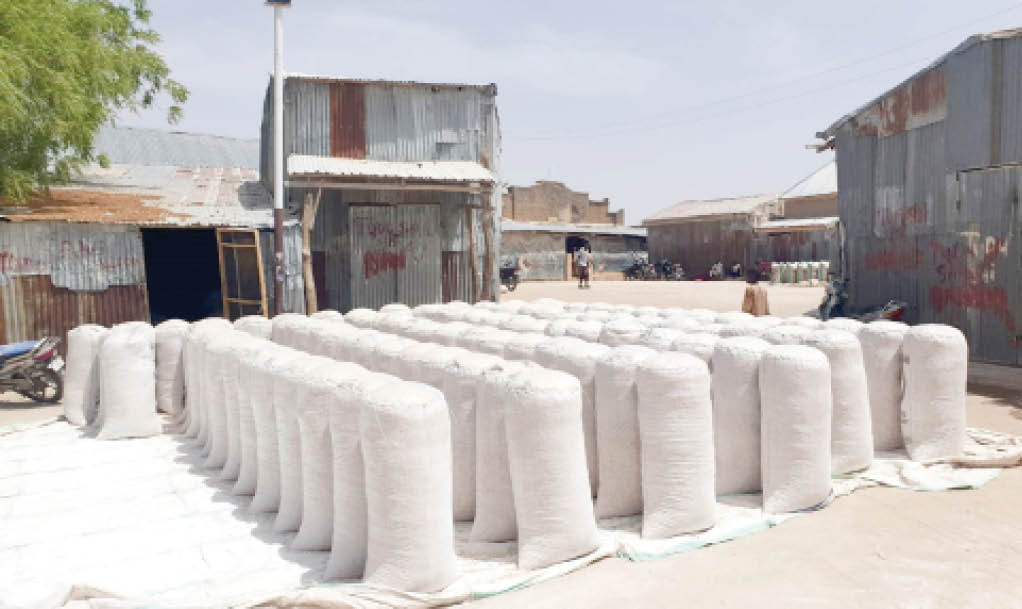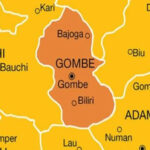The ‘Tudun Hatsi’ market, located at the heart of Gombe metropolis, where only grains are sold, still booms, 88 years after its establishment.
The market is said to have been established over eight decades ago at the premises of the Gombe old market (Tsohuwar Kasuwa) during the reign of Emir Haruna Umaru, who ruled Gombe between 1922 and 1935.
It is situated on a hill at the city centre, along the Emir’s Palace Road and directly opposite the Gombe old market; hence the name, ‘Tudun Hatsi’ (grain hill).
Daily Trust on Sunday reports that the Tudun Hatsi market is made up of temporary shops with corrugated roofing sheets and wood.
- Gombe community sues Gov Yahaya, Pindiga emir over mosque project
- Gombe tomato farmers seek solutions to post-harvest losses
Dahiru Muhammad, who has been a grain merchant for the last 18 years, described the type of grains they sell in the market and how they get them.
“Grains available in the market are beans, millet, maize, soya beans, sesame seeds, rice and guinea corn, among others. We go to other markets in rural villages within Gombe State, where farmers bring their produce.
“We get iron beans and sesame seeds from neighbouring states of Adamawa, Borno and Yobe, and even far places like Jigawa and Katsina states,” explained.
Muhammad said that beans were the most patronised items in the market, “because most of the merchants are from the South, where it is not usually grown. They come here and buy it, mainly for consumption.”
He added that despite the economic challenges in the country, there is still patronage, “because people must eat to survive. Notwithstanding the difficulties, grain merchants still come from other parts of the country to do business with us.”
He said they were also patronised by companies and merchants from places like Port Harcourt, Onitsha, Aba, Jos, Anambra, Plateau and Kogi, and even as far as Ghana, Chad and Niger Republic.
Apart from traders who own shops in the market, other people also bring goods to be sold on their behalf, after which they are paid a commission of N100 per bag.
Explaining how they conduct their business, Muhammad said, “Grain merchants used to come, but as a result of advancement in technology, they now send us details of the kind of goods they want. On our part, we send them the pictures of commodities at our disposal, and if they are satisfied with the quality, they make deposits through banks and we load it on trucks and send it to them.”
He, however, added that this comes with challenges, such as fluctuation in prices because of the current economic problems being experienced in the country.
“One of the problems we encounter is that sometimes we close the deal and customers pay the money, but before we send the goods, the price will change, so we either return their money or cancel the deal. This is problematic to us because sometimes we go ahead despite the changes and suffer losses because some customers will not pay the remaining balance on time. And we may lose some of the customers if we insist that they add the balance,” Muhammad explained.
He said Igbo traders and others from the southern part of the country preferred grains, especially beans from Gombe than other markets. “They mostly told us that they preferred to come to Gombe because the quality of the grains is better and cheaper than in other places,” he said.
Muhammad told Daily Trust on Sunday that they paid both the state government and the local government area over N8 million as monthly revenue.
“Over 10 trucks leave this market daily, and on each bag, we pay N60 to Gombe Local Government and the state Internal Revenue Service; and each truck carries at least 400 bags,” he said.
He also said transactions worth millions of naira were generated monthly from the market, but it is difficult to give exact figures since traders mostly conduct their businesses through banks.
He said the hike in the prices of foodstuff experienced all over the country was as a result of the exchange rate of the dollar, which affected the prices of fertiliser and other farm inputs. For instance, in the market, a bag of beans now sells at N95,000; maize, N55,000 per bag; millet, N52,000; soya beans, N59,000 and guinea corn, N54,000.
The grain merchant debunked the allegation that grain traders hoard foodstuff to generate more profit.
“People buy from us in large quantities and we don’t have the right to ask them what they would do with it. So, we cannot know if they hoard it after they buy it from us. However, in my opinion, the more expensive the commodity is, the more it affects the market and people cannot buy in large quantities,” he said.
Our correspondent reports that the Tudun Hatsi market also offers job opportunities to hundreds of youths.
It was gathered that over 1,000 traders have shops at the market and are supported by over 600 labourers who work in the market, loading and offloading grains into trucks for onward transportation to other parts of the country.
A labourer at the market, Malam Isa Sani, said the market offered hundreds of youths job opportunities.
According to him, their job is not limited to unpacking and re-packaging bags and loading them into trucks for transportion to various places.
“We charge from N300 to N350; and it takes five labourers to offload a truck, which is about N122,500 per truck. At the end of the working day, a labourer can go home with not less than N24,500.
“In fact, some of us sponsor our education from this job, others build houses; and we still shoulder the responsibility of our respective families.
“However, it depends on the volume of work at the market; some days we just chat and go home at the end of the day without getting a kobo,” Mohammed said.

 Join Daily Trust WhatsApp Community For Quick Access To News and Happenings Around You.
Join Daily Trust WhatsApp Community For Quick Access To News and Happenings Around You.

